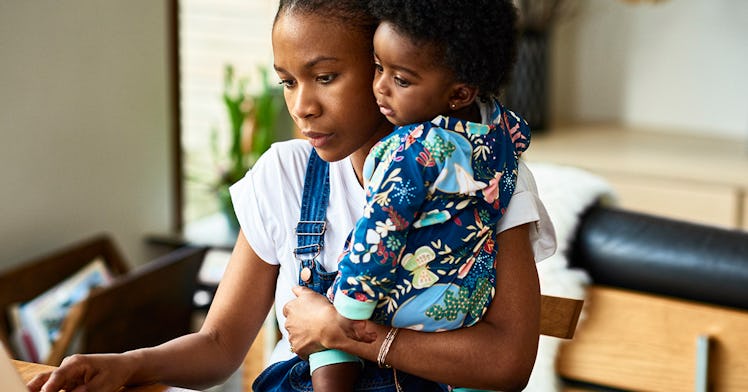These Moms Will Get Up to $1,000 a Month. Here’s How.
A guaranteed income program aimed specifically at moms of young children is changing the game.

Just as we say goodbye to the Child Tax Credit — at least for now — mothers in one U.S. state are receiving a different monthly child benefit. Some mothers of children three years old and younger as well as expectant mothers in New York State are set to receive a monthly check of $500 to $1000 for up to three years through a nonprofit called the Bridge Project.
The Bridge Project has received $16 million in funding from the Monarch Foundation, funded by entrepreneur Holly Fogle and her husband, venture capitalist Jeff Lieberman. The goal is to determine the impact of a monthly stipend on low-income families with young children.
The U.S. is one of the few developed countries that doesn’t offer some sort of guaranteed income for parents. Recently, the idea of guaranteed income has taken root, and some municipalities have given it a try—with much success. Former mayor of Stockton, Calif., Michael Tubbs, started the SEED program when he took office that guaranteed 125 low-income families $500 per month, and the results were pretty incredible. Data from the SEED program showed that parents were less anxious and depressed, were able to seek better-paying work and hold down jobs more easily, and were able to spend more time with their families. In other words, it was a roaring success.
The Child Tax Credit, which lasted for six months from July to December of 2021, was also hugely successful at lifting parents and their children across the country out of poverty. Families were better able to afford their basic necessities and even pay down debt. Unfortunately, the program has expired, and millions of children are at risk of falling right back into the poverty they just pulled out of.
The Bridge Project is already making a big difference in the lives of some low-income New York families—allowing parents to pay for necessities like rent and utilities and purchase necessary equipment like high chairs. A group of 100 mothers began receiving Bridge Project checks in July—50 received $500, and 50 received $1,000, guaranteed for three years.
In the second phase of the program, 100 mothers will receive $1000 for 18 months. These two groups will be compared to a control group that does not receive funding. The goal of the Bridge Project is to gauge the impact of the additional income on parents’ ability to parent and judge long-term outcomes for low-income children whose families receive a financial boost during their first three years of life. The families will be tracked to record the children’s developmental progress, rent and housing situations, and their mental and physical health.
According to the New York Times, guaranteed income projects are launching in at least 17 states. Los Angeles is piloting a program that will offer 3000 low-income families $1000 per month and Chicago will provide $500 per month to 5000 families.
These programs are coming at a time when they are sorely needed. Skyrocketing inflation, the end of the CTC, and the recommencement of federal student loan payments will leave parents up the proverbial creek, and many will be unable to pay for even the most basic necessities.
Guaranteed-income programs geared towards parents are known to work and have made huge differences worldwide. In the U.S., where we lag behind our European counterparts in both social services and parental services, child poverty is higher than in any other developed country in the world. The difference a guaranteed income could make, not only in the present, in paying for food and heat, but also in the long-term, where children grow up without food insecurity and aren’t living in poverty, would be staggering.
This article was originally published on